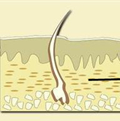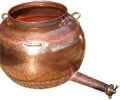The extraction of components of a substance by heating and collection of resultant vapours by condensation . This process may be used for the extraction of alcohol, essential oils and floral waters , for purifying water, desalination and in the petroleum industry. The four different processes of distillation are: Simple: Describes the basic distillation method for the traditional alembic by heating a liquid or mash in an alembic pot to encourage the evaporation of volatile substances and subsequent condensation . Steam: Employs steam to heat a substance sufficiently so as to release its volatile components. This is the process for the rotating column alembic and may be used for extracting essential oils and floral waters . Fractional: Allows for the separation of a complex solution into its different components in a single distillation run by taking advantage of the difference in their boiling points. When employed for alcohol distillation the resultant distillate will have a higher alcoholic volume than with other methods. The liquid in a fractional column is continuously redistilled in a single run. Continuous: A process of continuous uninterrupted collection of distillate



